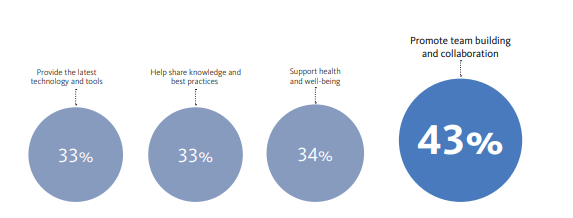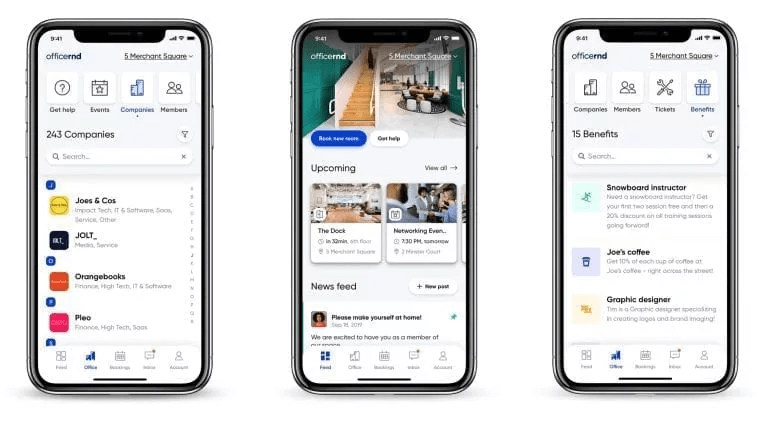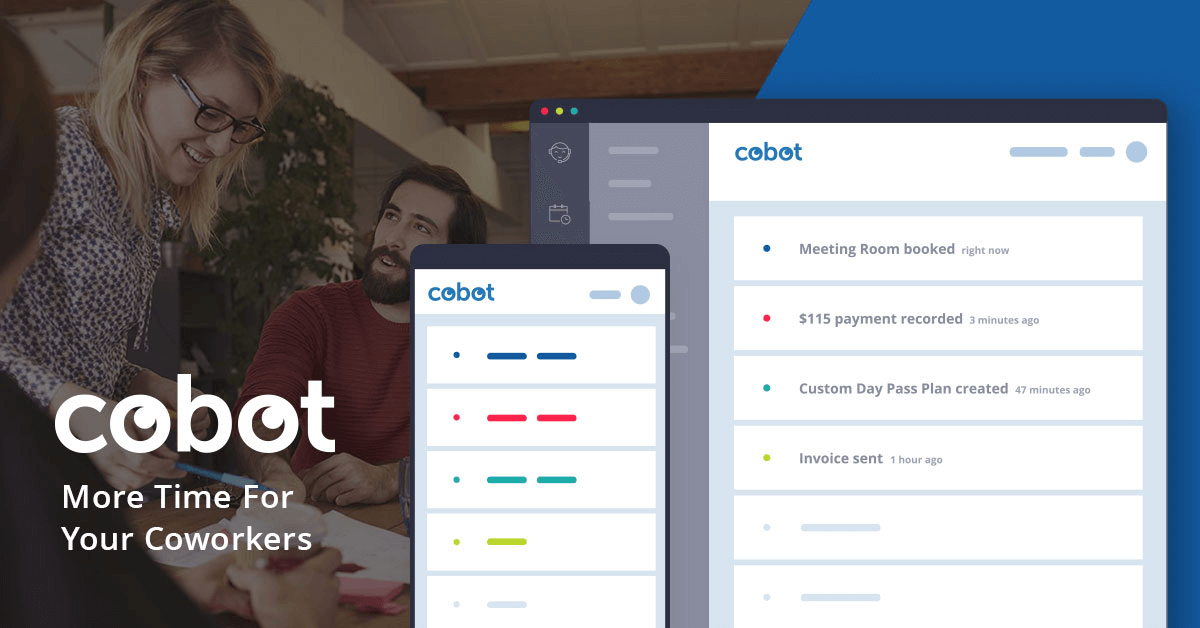Coworking startups often find it tough to retain customers, manage the space efficiently, engage the community, and ensure the overall security of their members. In fact, statistics reveal that more than 60 percent of coworking space providers find signing up new members challenging.
While the failure rate of startups may seem daunting and discouraging to many, proper market research and planning can help startup owners thrive and steer their venture towards success. Also, coworking spaces have a plethora of management systems available to assist business operations and overcome the challenges shared above.
In this post, you’ll find a list of effective tools that coworking startup owners can use to put their venture on the fast track to success.
Tools for Improving Customer Retention
Organizing interactive events and aiding collaboration between businesses can help build a close-knit coworking community. In fact, according to a workplace survey by Gensler Research Institute, 43 percent of respondents see team building and collaboration as an important aspect of a great workplace environment.

This sense of community can contribute to better customer retention. Here’s a list of tools that can help you manage events and build a virtual community for your workspace members.
1. Splash
Splash is an end-to-end event marketing tool that can be used to plan, promote, and enjoy great events for your coworking space. The tool can aid in website building, email marketing, ticket-selling, RSVP collection, and preparing guest lists. It automates all the processes along with gauging the response for your events. It creates an experience for your members and the community.
Other tools like Eventbrite, Eventzilla, idloom-events also help with holistic event management for your coworking space.
2. Andcards
The benefit catalog feature of this tool can be used to assemble all the discounts, offers, and services provided by coworking spaces in a visual catalog. You can categorize benefits for easy perusing by the members of the community. This tool also provides analytics to understand customers better and know what’s popular with them.

This tool is used by customers to stay updated on new offerings, thus improving customer engagement and retention.
3. OfficeRnD
This coworking management software is tailored to address the communication needs of coworking spaces. It enhances the usability of social media and other chat platforms for community members. It can be seamlessly integrated with chat applications like Slack.

This tool allows coworking space members to start conversations. It has a search feature like social media platforms, enabling users to search for coworkers and connect with them.
4. Bisner
This tool helps coworking space managers reinvent the social side of coworking spaces. Features like interest groups, activity feed, and chat functionality let the members connect easily. It also helps bring the community online and bolsters collaboration by helping companies and members find each other.
Tools for Efficient Utilization Of Equipment
Managing the available company resources is crucial to any business; more so, for startups. In a coworking space, it is important to make sure that all members have sufficient access to all the necessary equipment.

Fortunately, some tools can help with the efficient utilization of equipment, preventing issues like insufficient equipment that may disappoint members.
5. Coworkify
Coworkify is simplistic and easy to use coworking management software. It contains tools for all basic administrative tasks like booking and billing among others. It also allows members to book resources like projector halls or meeting rooms. Additionally, the software automatically calculates the charges of each member and issues invoices on behalf of the organization.
6. Nexudus
Nexudus is a white-label software that helps coworking spaces automate several tasks and processes. It also allows you to monitor member activity in terms of the use of space or equipment. The printing management feature of this software can be used to handle printing work at coworking spaces.
Tools For Improved Space Management
A majority of coworking spaces offer different types of workspaces, including meeting rooms, private offices, and shared open areas. Members may prefer one type of space over another but managing the space remains a challenge.

Here are a few tools that can help you with seamless scheduling and booking of common spaces, ensuring that all members get a fair chance at utilizing them.
7. Cobot
This software is flexible and user friendly. It can be used to manage all types of spaces ranging from a small creative space to a multi-location hub.

The tool streamlines the process of booking, invoicing, payment, and other administrative tasks. It also automates payment to your bank account and generates relevant business statistics. These reports can be used to optimize pricing and improve user experience.
8. Skedda
Skedda is a pocket-friendly scheduling tool that’s popular among small establishments. It helps with the online booking of meeting rooms, phone booths, rentable office pods, hot desks, and other common facilities available at coworking spaces. The generous offering of the free version and low pricing of the premium model makes this tool lucrative among startups.
9. Robin
Another tool to help you effectively manage your coworking space is Robin. It can be used for managing flexible desks and easy cloud migration. It lets you create seating plans, view locations of members, see the status of meeting rooms, and manage everything effortlessly without any additional spreadsheets.
Tools For Enhanced Security
The collaborative and welcoming nature of coworking spaces often gets in the way of the safety of its members. Nearly one-quarter of coworking employees (23 percent) say they face security/safety issues at their office space.
Security is not just limited to physical security. Data is also at risk of cyber attacks or security breaches. The 2020 Data breach investigations report by Verizon reveals that a staggering 28 percent of total breaches involve small businesses.

However, certain tools and technologies can be used to minimize the risk and alleviate the degree of security at coworking spaces.
10. Essensys
To safeguard the data of your business and your customers’ business, invest in an enterprise-grade WiFi solution. Essensys’ software is designed to accommodate multi-site operators. With secure WiFi, customers enjoy global roaming across multiple sites, resilient performance across multiple users and devices, and a secure and seamless member experience. These security features can differentiate your coworking space from others.
Separate network setup for guests adds to the security of your customers’ business and provides a better internet experience to the visitors. You can also set up different networks for different customers, ensuring that a breach at one business doesn’t affect the other.
11. Tapkey
An access control system that keeps a log of every visit is a huge advancement in the security of your shared workspace. Tapkey’s cloud-based system allows you to maintain restricted areas for users and customize access control according to their needs.
For instance, a meeting room will only be accessible to members who have booked it.
This tool also offers a solution for equipment theft through furniture locks that can only be opened by people with access information. It also maintains an access log of every user.
What’s more? It can be integrated with your existing CRM, thereby eliminating the need for manually adding and removing users on two platforms.
12. CoReceptionist
In addition to these tools, deploying a visitor management system like CoReceptionist can be a smart move towards improving member experience. Ensuring the safety of everyone who visits your coworking space is important. This tool signs in visitors, keeps a track of their activities, and guides them to their host. It can also be used to enhance the mail delivery system at coworking spaces.
CoReceptionist can also be used to send notifications to all the visitors in case of any emergency that needs evacuation. The entire process is automated and indicates the professionalism and efficiency of the workspace.
Final Thoughts
In the present cut-throat environment, using coworking space management systems isn’t enough. To keep your coworking space business up and running, you need to market yourself to the right people and use those leads to generate more revenue. Loose Cubes,
Happy Desk, Liquid Space, and Share Desk are some platforms that can be used to connect with potential customers for your coworking space.
While challenges may differ for every business, preparing for them proactively will keep you a step ahead of your competitors. Use the tools shared above to build and manage a thriving coworking space.
Do you use any other tools to better manage your coworking space? We’d be glad to hear about it in the comments section!


